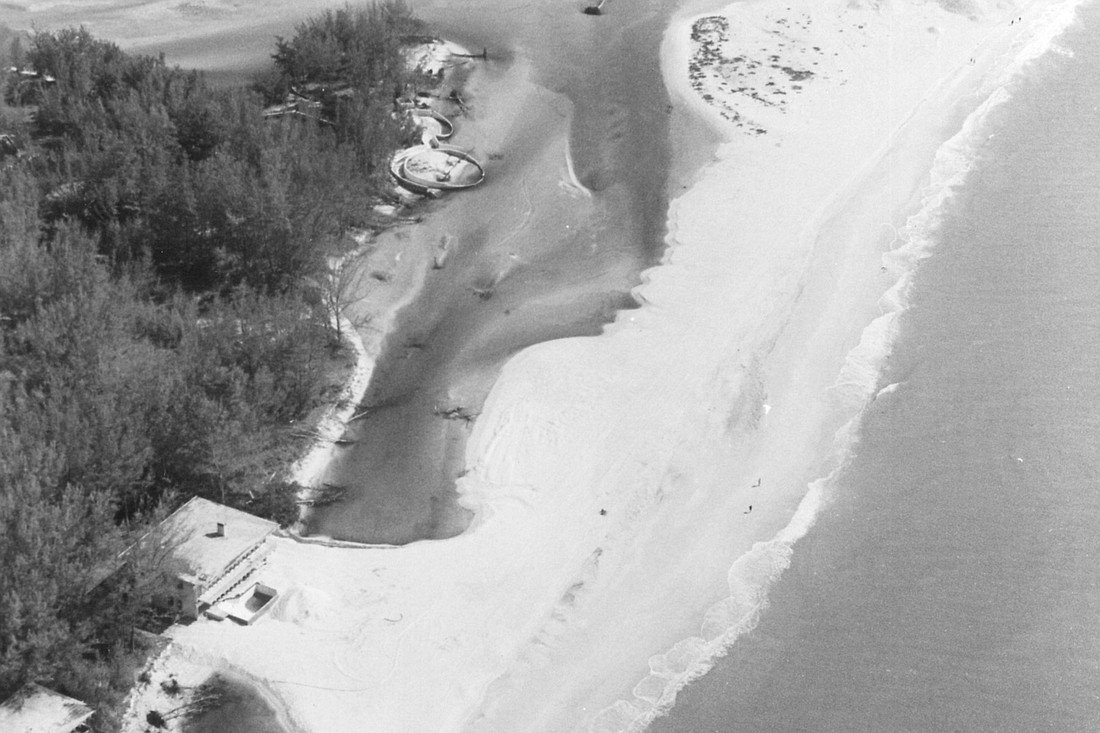- April 16, 2024
-
-
Loading

Loading

Throughout the holiday week, YourObserver.com will be counting down the top 12 stories of 2011 (one from each month) from our Longboat, East County and Sarasota Observers and the Pelican Press. Check back each day for a reprinting — along with any relevant updates — of the biggest news items of the year.
ORIGINALLY PUBLISHED MARCH 17, 2011
Florida authorities who twice denied Sarasota County permission to restore the Midnight Pass coastal inlet that previously separated Siesta Key from Casey Key may have thought the fight was over. If so, they can think again.
The battle has resumed.
Last week, the Midnight Pass Society and a group of Siesta Key business owners and homeowners jointly sued both the federal and state agencies involved in thwarting restoration efforts. The suit was filed at the U.S. District Court for the Middle District of Florida in Tampa.
It was prepared by Sarasota attorney J. Geoffrey Pflugner;
Indianapolis, Ind., attorney Robert D. Epstein; and Bloomington, Ind., attorney James A. Tanford.
The suit seeks to overturn the state’s previous denials and order that the state approve a restoration project.
“We’ve tried to cooperate with federal and state agencies since the mid-1980s,” Midnight Pass Society President Jim Herbert said. “After spending a quarter-century trying to work within the system, we concluded it was not a good strategy. There were no more options available.”
Midnight Pass was a popular coastal inlet for boaters until it became unstable in the 1970s. It was closed in 1983 by two Siesta Key beachfront residents when the inlet migrated northward and threatened their homes. They promised to safely re-establish it farther to the south.
Syd Solomon and Pasco Carter Jr., both now deceased, financed several failed attempts to dredge open an inlet, then pleaded financial hardship to the Sarasota County Commission and asked for relief. Sympathetic commissioners let them off the hook.
In 1988, the county submitted a Midnight Pass restoration plan; it was rejected by state authorities in 1991 after a permit evaluation process that went on for almost three years. A subsequent appeal failed. But restoration advocates refused to let the issue die.
In November 2004, coastal engineer Karen Erickson applied for permits from the U.S. Army Corps of Engineers and Florida Department of Environmental protection that described a dredging project to remove 360,000 cubic yards of sand from the sealed inlet. Erickson was hired as a county consultant after she successfully negotiated on behalf of New Hanover County, N.C., for federal and state permits to relocate and restore Mason Inlet in 2002 without the use of seawalls, rocks or other hardened structures.
After an exhaustive four-year process of questions and responses to state authorities, permits to restore Midnight Pass were again denied. Erickson, who had moved her office from Gainesville to Sarasota, took on new projects. Many thought the effort was finally over.
“Sarasota County spent almost $1 million trying to get permits,” Herbert recalled. “Mr. Epstein, who spent two years researching the case, decided it was a worthwhile endeavor to seek relief through the courts. Karen Erickson is a stand-up lady and provided him with her expertise.”
The suit specifically names two state agencies, three federal agencies and a list of government officials. It states that the man-made closure of Midnight Pass was wrong and that both the 1991 and 2008 decisions to deny permits for its restoration were “unreasonable, arbitrary and capricious.” Agencies named are the Florida Department of Environmental Protection, Florida Fish and Wildlife Conservation Commission, U.S. Environmental Protection Agency, U.S. Fish and Wildlife Service, and the U.S. Army Corps of Engineers.
They are variously charged with failure to enforce provisions of the U.S. Clean Water Act, U.S. Endangered Species Act, U.S. Commerce Clause, and Equal Protection Clause of the U.S. Constitution. Florida agencies are responsible for enforcing federal laws.
Four of the five counts directly address alleged violations of federal laws, while the fifth specifically deals with the Florida Department of Environmental Protection’s finding that a Midnight Pass restoration project was not in the public’s interest.
“It does so without addressing the hundreds of acres of damaged habitat that reopening [Midnight Pass] would restore and improve upon,” the fifth count states, “nor the millions of dollars that would be saved by preventing further erosion of precious beachfront.”
The lawsuit has tentatively been assigned to Federal Judge Steven D. Merryday. No dates for pre-trial motions or hearings have been set.
UPDATE: Because of minor technical errors in the lawsuit, it was withdrawn for revision during the summer and was scheduled